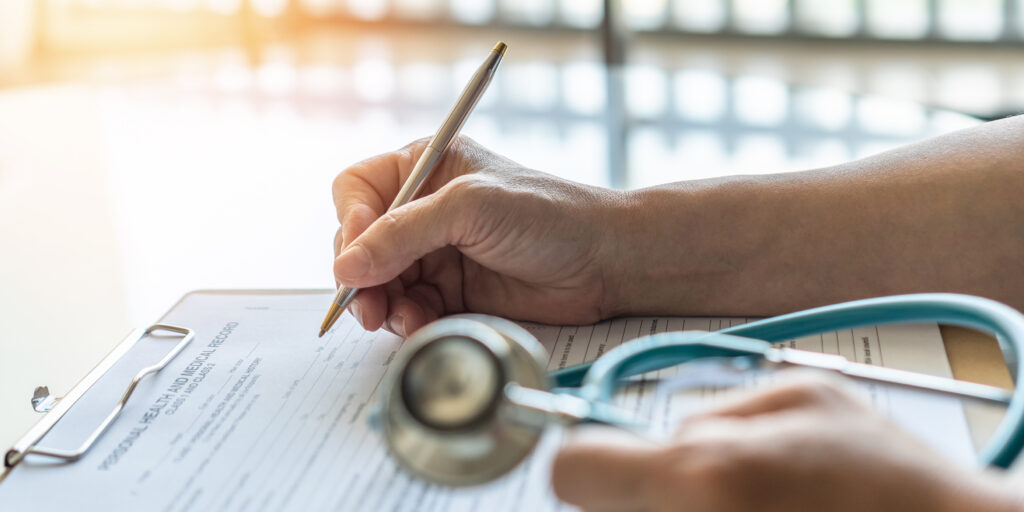Confused by cancer screening recommendations? Not sure where to go for cancer screenings in Queens? SHAREing & CAREing can help!
As of early 2023, this article reflects the most recent and trusted recommendations of medical experts, including the American Cancer Society, National Cancer Institute and the Centers for Disease Control and Prevention (CDC).

Keep in mind that all of the following recommendations apply only to people with average risk factors for each kind of cancer. Your family history and your personal health history (including diet, weight, alcohol use, and smoking habits) may lead your doctor to determine that you have higher than average risk factors, which might mean additional or earlier screenings.
Many cancers are hereditary. If you have any type of cancer in your family, especially if it’s a close relative like a parent, child or sibling, or if your family has young cancer sufferers or members with multiple forms of cancer, consider getting a genetic test. Studies have shown genetic tests reduce stress and they will help you and your doctor create a more informed and personalized screening schedule for you.
Need help determining which cancer screenings are appropriate for your age, family history or personal situation? Sign up for our free cancer screening reminder service. Based on your background, such as personal and family cancer history and smoking, we’ll recommend the most appropriate screenings, space them out in a logical order throughout the year and remind you with an email. You can customize your dates, screenings, and unsubscribe at any time.
Remember, screenings are preventative and meant to catch cancer before there are symptoms. If you have any abnormalities or symptoms, like moles on your skin, lumps in your breast, or a lingering cough, see your doctor right away. Don’t wait for a screening.
Breast Cancer
The typical screening for breast cancer is a mammogram, an X-ray image of the chest. These imaging tests are recommended every 1-2 years for anyone over 50, who has (or used to have) breasts, and is at average risk for breast cancer. Talk to your OB/GYN or primary care doctor about starting mammograms earlier or doing them more frequently if you or anyone in your family has the BRCA gene mutation, male breast cancer, a history of breast or ovarian cancer, or other breast cancer risk factors. Mammograms during pregnancy can be safely performed, though they’re not typical. Speak to your doctor about breast ultrasounds or breast MRIs in addition to or instead of mammograms if you have dense breasts.
Breast self-exams (BSEs) are free 20-minute checks you make of your own breasts in the privacy of your own home. Anyone who has (or has ever had) breasts or has a family or personal history of breast cancer should do breast self-exams at the same time of the month every month. Knowing how your breasts normally feel will help alert you of changes that you can bring to the attention of your doctor.
Colorectal Cancer
Colorectal cancer can be screened for using a number of tests including stool tests, a CT colonography (virtual colonoscopy) or a flexible sigmoidoscopy, though colonoscopies are the most commonly prescribed today. Most people of average risk should begin regularly screening at the age of 45. If you have risk factors for colorectal cancer, such as a family or personal history, being of African-American or Ashkenazi Jewish descent, Type 2 Diabetes, obesity, or not following a healthy diet, talk to your doctor about starting screening early.
Cervical Cancer
Cervical cancer can be easily detected by a pap smear, a procedure where a small amount of cells are gently removed from the cervix with a small brush by your OB/GYN doctor. This test detects HPV (the human papillomavirus) which can cause cancer in the cervix as well as any abnormal cells that might turn into cancer.
This test should be done every 3-5 years between the ages of 21 and 65. If you are HIV positive, have previously had cervical cancer or an abnormal screening or biopsy, have a weakened immune system or were exposed to DES as an unborn child, talk to your doctor about more frequent screenings or also getting them earlier and later in life.
Lung Cancer
Lung cancer is screened for using a low dose lung CT Scan (LDCT), an x-ray image of your chest. You should be regularly screened for lung cancer if:
- you are over 50 and currently smoke, or
- you quit smoking in the last 15 years and have accumulated 20 “pack years.”
A pack year is the equivalent of smoking 1 pack of cigarettes (20 cigarettes) per day for a year. 20 pack years could be smoking: 20 cigarettes per day for 20 years, or 10 cigarettes per day for 40 years, or 40 cigarettes per day for 10 years.
If you have other risk factors for lung cancer such as exposure to radon, asbestos or second-hand smoke, or a family history of lung cancer, mention those to your doctor when you discuss your annual cancer screenings.
Cancers Where Screening Is Not Recommended
Screenings can be life-saving for the cancer types above. For other cancers we simply haven’t developed a screening method proven to decrease deaths, or the tests we have offer limited benefit when compared to their potential harm. Currently, medical experts do not recommend screening for healthy and otherwise symptom-less people for these cancers.
- Ovarian Cancer
- Endometrial cancer
- Pancreatic cancer
- Prostate Cancer
- Testicular Cancer
- Thyroid
- Skin Cancer
- Liver cancer
- Bladder cancer
- Oral cancer
If you have additional questions, need help covering the cost of cancer screenings, need a referral to a local provider, or speak English as a second language and need translating help, we are here for you. Learn more about our Patient Navigation services or contact us to discuss how we can assist you with cancer screenings in Queens County, including Astoria and Long Island City.
Sources
- Screening Tests, Centers For Disease Control & Prevention (CDC)
- Cervical Cancer Screening, National Cancer Institute
- Screening For Skin Cancer, US Preventative Services Task Force (USPSTF)
- Can Ovarian Cancer Be Found Early?, American Cancer Society

